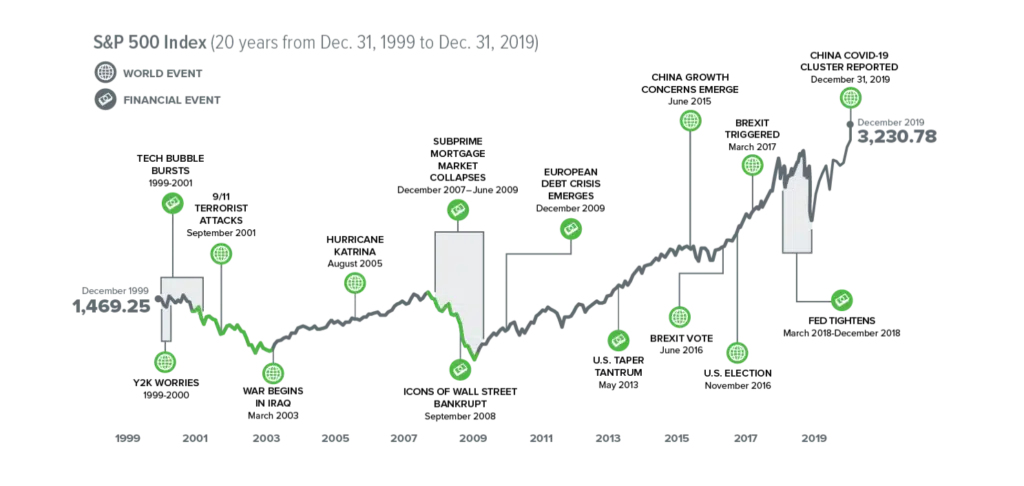
Goals are overrated.
While a goal to grow your money is motivating – goals don’t make progress, systems do.
Motivation gets you started but consistency ensures you make progress.
“You do not rise to the level of your goals. You fall to the level of your systems.” – James Clear
The goals set the destination, habits bridge the gap between where we currently are and where we want to be.
Goals set the course for your financial plan, but habits are what make your plan become reality.
Here’s 6 financial systems to avoid financial catastrophe.
- Is this removing a negative from my life?
When you take on debt, ask yourself:
Is this removing a negative from my life?
You can’t control what the market is doing or whether political forces choose war over peace, but you can control your desire and impulse to act regarding accumulating debt.
Used responsibly:
Debt can allow you to acquire new skills that can be exchange for increased income.
Used irresponsibility:
Debt becomes dead weight and drains your financial freedom.
How long can you sustain your level of debt if you lose your job?
Your answer should be 3-6 months.
If it’s not?
Reduce your spending, sell items that have created your debt (downsize), or make more money.
If this makes you upset, you might consider revisiting your relationship with what brings happiness (hint: it’s not what you own).
- Automate saving to 15% of gross income
Saving is great for two reasons.
It helps reducing your spending and opens the opportunity for your money to make more money.
Saving is one of the best things you can do to grow your net worth.
Automation is the second-best thing you can implement.
Why?
Because it’s effortless discipline.
Automating your finances is like being able to complete a 30-minute workout with the snap of a finger.
You become one step closer to your dream body with little effort.
Automating your savings works the same way.
More reward. Less effort.
Are you letting financial freedom slip through your fingers by not automating?
- Begin with the end in mind
Start at the end and work backwards.
Why you’re doing what you’re doing is just as important as how you do what you do.
Goals are overrated if there is no action put behind them.
Goals are underrated if they’re a forcing function for action.
Don’t worry about the goal being perfect, worry about getting started.
Imperfect action is better than perfect inaction.
How can you begin sooner?
- Risk = running out of money
Risk is not market volatility.
Risk is running out of money.
Volatility in the market is normal (& should be expected)
After all:
How could you expect a higher return in the market without volatility?
If everyone could grow their wealth at 8%/yr without any loss of principal – everyone would do it!
It’s easy to fantasize about what wealth brings, it’s hard to practice the steps of wealth creation.
Many forget:
Volatility is the price you pay for higher expected returns.
Don’t let the markets swings get in the way of you building wealth.
Remember:
Decades > days.

- Live Below Your Means
It’s easy to fall prey to our impulses.
A spur-of-the-moment purchase can be a temporarily gratifying experience.
Whether it’s a new handbag, pair of shoes, or watch, the act of the spontaneous purchase can invoke many emotions that leave us feeling euphoric.
Here’s the problem:
Wealth exists not to those who want more, but to those who desire less.
Bad habit constricts your financial freedom like a python attacking its prey until there’s no life left.
Step off the hedonic treadmill.
It doesn’t matter if you make $50,000 or $500,000 (or $5,000,000) per year.
Spend less than you make (it’s nonnegotiable).
Just establishing what our financial goals are is not enough to help us reach them.
We need to devise a system that bridges the gap between where we are and where we want to be.
Practicing our habits consistently, allowing their effects to compound over time, will provide us the much-needed momentum to work towards our goals.
Whether that’s automating our savings to help it grow or learning to find joy in tempering our desires, the key to our success with any aspect of our lives lies in the habits we’ve built.
What’s one habit you can build to make your financial life easier?



